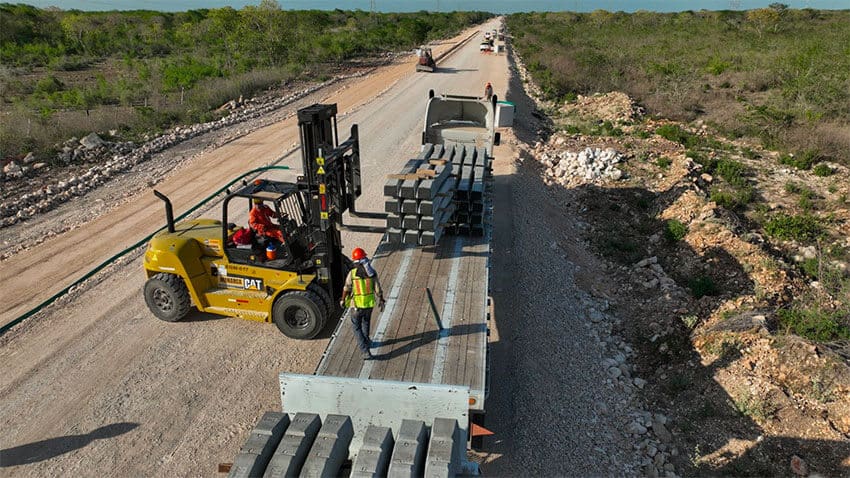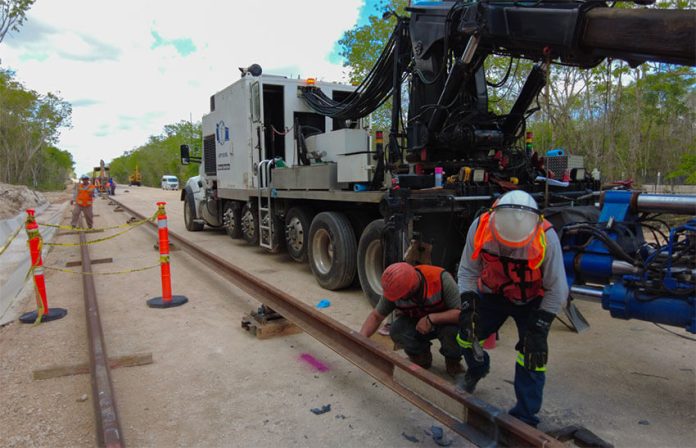A federal judge has issued a definitive suspension order against the Quintana Roo section of the Maya Train railroad between Playa del Carmen and Tulum, but President López Obrador pledged Tuesday that work will continue once the “unfounded” ruling is overturned.
Mérida-based judge Adrián Novelo ruled that work on the southern part of Section 5 (Tramo 5 Sur) of the US $10 billion railroad can’t proceed due to the absence of an authorized environmental impact statement (EIS). His ruling, made public on Monday, also precludes the removal or destruction of vegetation along the route, which runs through the Mayan jungle.
In issuing a provisional suspension order in April, Novelo ruled that all work on Tramo 5 Sur must stop due to the “imminent risk” of “irreversible damage” to the Mayan jungle, caves, subterranean rivers and cenotes (natural sinkholes) and the absence of environmental studies and permits. The lawsuit that led to that order, which has now become definitive, was filed on behalf of three speleologists by Defendiendo el Derecho a un Medio Ambiente Sano (Defending the Right to a Healthy Environment), a Cancún-based organization.
Novelo granted a second provisional injunction against the Quintana Roo railroad section earlier this month.
López Obrador said the government would challenge the latest order, but resolution of the matter via that route could take months. A quicker way to resolve the issue would be to present an Environment Ministry-approved EIS to the judge.
The EIS for Tramo 5 Sur is currently being reviewed as part of a public consultation process that will conclude on June 17.
Once the EIS has been approved by the Environment Ministry (Semarnat), the government will be in a position to file an application for the revocation of the suspension. Revocation won’t be automatic, however, because the government will still have to convince Novelo that the environmental damage caused by the construction and operation of Tramo 5 Sur will be minor and that the project is justified due to the economic and social benefits it will bring.
Swathes of jungle have already been cleared to make way for the route, which was moved inland after the Playa del Carmen business community complained about the construction of the railroad through the center of that city. Protests against the rerouted section have been held at the site of the deforestation and there is also a social media campaign calling for its cancellation.

If the government presents the EIS to the judge as part of an application to have the definitive suspension order revoked, the environmentalists that were granted the order could broaden their lawsuit and ask Novelo to suspend its effects, Reforma reported. If the judge did that, work on the project could be blocked for even longer than is currently anticipated, the newspaper said.
Such a delay could upset the government’s plan to have the Maya Train begin operations in 2023, although López Obrador asserted that time could be recovered once the definitive suspension order is invalidated.
The National Tourism Promotion Fund (Fonatur), which is managing the project, appears confident that work on Tramo 5 Sur won’t be held up for too long.
It said in a statement Monday that the order is only definitive until the EIS issue is resolved. Fonatur added that the EIS is currently being processed by Semarnat – even though the consultation process hasn’t finished – and noted that it’s made up of more than 4,000 pages prepared by experts.
“For Fonatur, the Tramo 5 Sur EIS is a solid document that considers possible impacts but which also plans abundant mitigation actions in favor of the environment, which will join measures already underway such as the reforestation of the southeast with almost 500 million trees and the strengthening of natural areas,” the statement said.
Asked about the suspension order at his news conference on Tuesday, López Obrador said the government would “continue with the entire legal procedure without any problem.”
“We’re certain that the project will continue. … Although the project is stopped now, we’re going to restart it and make up time,” he said.
“… We’re going to comply legally and they won’t be able to stop us. Private interests are not going to impose themselves, they won’t be above the general interest, the interest of the people, … the nation’s interest. Before they did and undid [whatever they wanted] but that’s not the case now,” López Obrador said.

The president repeated his claim that opponents of the Maya Train are “pseudo-environmentalists” and charged that the latest court order has no basis.
“This is a political issue of those who don’t want the project to be carried out. They’re pseudo-environmentalists, financed by large companies … and also foreign governments. There are environmentalists funded by the United States government,” he said.
With regard to the commencement of work on Tramo 5 Sur before the EIS had been completed, López Obrador noted that the project was able to go ahead thanks to the infrastructure decree he issued late last year.
The decree instructs government agencies to grant provisional authorizations and permits to projects deemed to be of public interest and national security in a maximum period of five working days so as to ensure their timely execution.
López Obrador claimed that the decree – part of which was suspended by the Supreme Court late last year – wasn’t taken into account by the judge who issued the definitive suspension order.
In contrast, Novelo’s ruling was welcomed by opponents of the rail project, one of whom described it as “a small victory” but acknowledged that the fight isn’t over.
“It’s proof that everything we’ve been saying is true,” said Roberto Rojo, a biologist and speleologist.
“We’re happy because we were afraid that the judge would be pressured and give in. But now we feel hopeful, confident that there is still someone who keeps vigil over the rule of law in this country,” he told the newspaper El Universal.
Rojo was visiting caves along Tramo 5 Sur with one of the speleologists behind the lawsuit when he heard the news about the latest ruling.
“Receiving the news … [allowed] the release of a whirlpool of feelings – anxiety, desperation, anger, impotence and now happiness,” he said, adding that “we know this doesn’t end here.”
“It’s just one battle … and we’re working on something to foster the regeneration of the jungle that has been damaged, something that will give it protection,” Rojo said.
He explained that the aim of environmentalists is to have the land surrounding Tramo 5 Sur declared a Natural Protected Area, or ANP. Rojo also said that area meets all the requirements to become a UNESCO World Heritage site.
An ANP along the Tramo 5 Sur route would complement the Sian Ka’an Biosphere Reserve, Rojo said, referring to a UNESCO-protected area in the Caribbean sea and along Quintana Roo’s east coast.
With reports from Milenio, El Universal and Reforma
